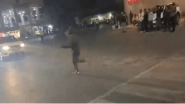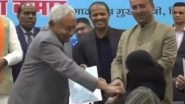New Delhi, Feb 7 (PTI) Union Home Minister Amit Shah on Tuesday asked Uttar Pradesh Chief Minister Yogi Adityanath to review the progress of implementation of the three new criminal laws next month and enforce them fully in the state as soon as possible.
This was conveyed by Shah to Adityanath during a review meeting in the home minister's office at North Block here.
The home minister said the Uttar Pradesh chief minister should review the progress of implementation of the three new laws every 15 days and the chief secretary and director general of police once a week with the officials of all the departments concerned, according to an official statement.
Shah stressed that 100 per pent implementation of the new criminal laws should be ensured in all the seven commissionerates of Uttar Pradesh by March 31 and in the entire state as soon as possible.
Also Read | PM Narendra Modi Sets Example by Not Using Taxpayer Money for Personal Festivities, RTI Discloses.
He asked Adityanath to review the progress of implementation of the new criminal laws in February and implement them fully in the state as soon as possible, the statement said.
The Bharatiya Nyaya Sanhita, the Bharatiya Nagarik Suraksha Sanhita and the Bharatiya Sakshya Act replaced the colonial-era Indian Penal Code, the Code of Criminal Procedure and the Indian Evidence Act of 1872, respectively.
The laws were rolled out on July 1, 2024.
The implementation and current status of various new provisions related to police, prisons, courts, prosecution and forensics in Uttar Pradesh were reviewed in the meeting.
Shah said the full implementation of the new criminal laws in the states with large populations like Uttar Pradesh will send a positive message across the entire country.
During the discussion in the meeting, he said the three new criminal laws brought under Prime Minister Narendra Modi's leadership are not punishment oriented but victim-centric and their aim is to ensure speedy justice.
Emphasising the need to increase the use of technology, the home minister said there should be more than one forensic mobile van available in every district of the state.
He also mentioned that forensic teams should be divided into three categories - serious, common and very common - so that resources and experts can be used more efficiently and the serious cases can be given priority.
Shah said there should be regular and continuous monitoring of how many of the total registered Zero FIRs have been transferred to the respective states.
Senior officials of the Ministry of Home Affairs and the Uttar Pradesh government attended the meeting.
(The above story is verified and authored by Press Trust of India (PTI) staff. PTI, India’s premier news agency, employs more than 400 journalists and 500 stringers to cover almost every district and small town in India.. The views appearing in the above post do not reflect the opinions of LatestLY)













 Quickly
Quickly


